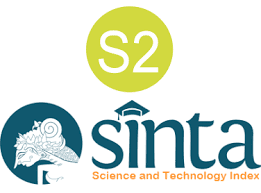Kerja Sama Internasional dalam Mengatasi Dampak Negatif Cuaca Antariksa
Abstract
Full Text:
PDFReferences
Amory-Mazaudier, Christine, Sandro Radicella, Patricia Doherty, Sharafat Gadimova, Rolland Fleury, et al., “Development of research capacities in space weather: a successful international cooperation.” Journal Space Weather and Space Climate 11, no. 28 (Februari 2021): 1-12, https://doi.org/10.1051/swsc/2021006 (diakses 4 Agustus 2023).
Fry, Emma Kiele. “The Risks and Impacts of Space Weather: Policy Recommendations and Initiatives.” Space Policy 28, (Juni 2012): 180-184. http://dx.doi.org/10.1016/j.spacepol.2012.06.005 (diakses 23 Juli 2022).
Holsti, K. J. International Politics, A Framework for Analysis, Fourth Edition. Jakarta: Erlangga, 1983.
International Space Environment Service. “ISES: Welcome to the International Space Environment Service.” International Space Environment Service. http://www.spaceweather.org/ (diakses 23 Juli 2022).
International Space Weather Initiative. “International Space Weather Initiative: ISWI.” International Space Weather Initiative. http://iswi-secretariat.org/ (diakses 23 Juli 2022).
Jones, Walter S. Logika Hubungan Internasional: Kekuasaan, Ekonomi-Politik Internasional, dan Tatanan Dunia 2. Jakarta: PT Gramedia Pustaka Utama, 1993.
Ledvina, Vincent E., Erika Palmerio, Ryan M. McGranaghan, Alexa J. Halford, Aidan Thayer, et al., “How open data and interdisciplinary collaboration improve our understanding of space weather: A risk and resiliency perspective.” Frontiers in Astronomy and Space Sciences 9, (Desember 2022): 1-9. https://doi.org/10.3389/fspas.2022.1067571 (diakses 4 Agustus 2023).
Mann, Ian R., S. Di Pippo, H. J. Opgenoorth, M. Kuznetsova dan D. J. Kendall. “International Collaboration Within the United Nations Committee on the Peaceful Uses of Outer Space: Framework for International Space Weather Services.” Space Weather 16, (Mei 2018): 428-433. https://doi.org/10.1029/2018SW001815 (diakses 23 Juli 2022).
Pan European Consortium for Aviation Space Weather User Services. “PECASUS for ICAO.” Pan European Consortium for Aviation Space Weather User Services. http://pecasus.eu/ (diakses 23 Juli 2022).
Rourke, John T. International Politics on the World Stage. California: Brooks/Cole Publishing Company, 1986.
Santoso, Anwar. “Cuaca Antariksa dan Dampaknya terhadap Jasa Keuangan atau Layanan Perbankan.” Media Dirgantara 10, no. 1 (2015): 6-8.
United Nations Committee on the Peaceful Uses of Outer Space. “Report of the Scientific and Technical Subcommittee on its forty-ninth session, held in Vienna from 6 to 17 February 2012.” United Nations Committee on the Peaceful Uses of Outer Space. https://www.unoosa.org/pdf/reports/ac105/AC105_1001E.pdf (diakses 23 Juli 2022).
United Nations Committee on the Peaceful Uses of Outer Space. “Thematic Priority 4. International Framework for Space Weather Services.” United Nations Committee on the Peaceful Uses of Outer Space. https://documents-dds-ny.un.org/doc/UNDOC/GEN/V17/081/73/PDF/V1708173.pdf?OpenElement (diakses 23 Juli 2022).
United Nations Committee on the Peaceful Uses of Outer Space. “Report of the Scientific and Technical Subcommittee on its fifty-seventh session, held in Vienna from 3 to 14 February 2020.” United Nations Committee on the Peaceful Uses of Outer Space. https://www.unoosa.org/res/oosadoc/data/documents/2020/aac_105/aac_1051224_0_html/V2001426.pdf (diakses 23 Juli 2022).
United Nations Office for Outer Space Affairs. “International Space Weather Initiative (ISWI).” United Nations Office for Outer Space Affairs. https://www.unoosa.org/oosa/en/ourwork/psa/bssi/iswi.html (diakses 23 Juli 2022).
Yatini, Clara Y. “Cuaca Antariksa.” Berita Dirgantara 9, no.1 (2008): 20-24.
Wu, Ji, Qingjiang Bai, dan Yongjian Xu. “International Cooperation: A Brief History We’ve Experienced.” Space Weather Space Climate 11, no. 27 (Februari 2021): 1-5. https://doi.org/10.1051/swsc/2021008 (diakses 23 Juli 2022).
Refbacks
- There are currently no refbacks.










